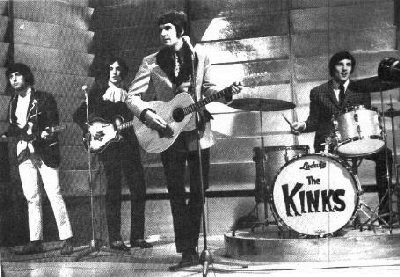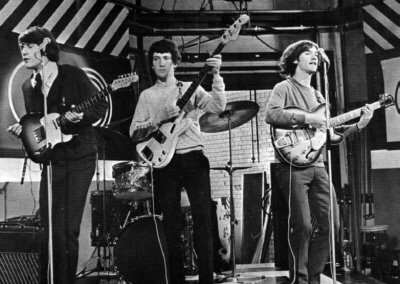
The Kinks Were Ray Davies (Guitar, Lead Vocals), Dave Davies (Lead Guitar), Pete Quaife (Bass) & Mick Avory (Drums).
Some call the Kinks “the original punks” because of the dirty sound of their early records, others go as far as to call them the fathers of heavy rock. They were a quartet in which tensions were constant among its members, with the two brothers that led the band eventually becoming estranged from each other. The Kinks were actually banned from performing in the States owing to their riotous onstage behavior. And people like Pete Townshend have said that Ray Davies (the band’s main composer) should have been a poet laureate. And I think most people who listen to “Waterloo Sunset” is inclined to feel the same way.
Aggression, volume, wit, profoundness and delicacy. These are the adjectives you can extract from the above. And these adjectives apply either in part or in whole to my favorite bands, and to every band that has marked me – The Who, The Jam, Oasis… The Kinks were simply one of the most influential bands in the history of British music.
They were part of the initial wave of British Invasion bands, with their third single being a hit everywhere it started spinning. Dave Davies’ guitar insinuated the power that harder-rocking outfits were to unleash a decade later into the airwaves. He had sliced the amplifier with a blade in order to get the gritty sound. The song was called “You Really Got Me”, and it was to influence The Who both structurally and thematically, and the most realized punk and new wave acts of the late 70s such as The Clash, The Jam and XTC always expressed that they either dearly respected or even worshipped The Kinks.
“You Really Got” was followed by “All Day And All Of The Night”, with the main riff expanded from three to five notes; “All Day And All Of The Night” was succeeded by songs like “Set Me Free” and “Tired Of Waiting For You”, and Ray Davies’ evolution as a composer was to be awe-inducing as he began describing the life of his countrymen in a stunningly elegiac way. Maybe being banned from the US made him pick his themes closer to home. Maybe. But he was a nostalgic from the very start, a man who could see how “the old ways” were becoming superseded by something less innocent and notably less pure. Songs like “Days” and albums like the critically acclaimed “The Village Green Preservation Society” and “Arthur” dealt with the end of an era he had lived and loved.
The band’s fortunes were to decline in the early ‘70s, in part because they became a more theatrical outfit and also because the relationships among band members turned too sour to handle.

The Kinks In Their Prime
However, when genres like punk and new wave manifested themselves The Kinks were to enjoy a second period of stardom that lasted until the year 1985. Albums like “Low Budget” and the live record “One For The Road” epitomize this return to glory.
After 1985, the charts became elusive once again. The pattern was maintained until their dissolution in 1996. But the band at least had the ultimate token of recognition in the fact that many of the pivotal acts of the day like Oasis and Blur spoke in endless praise of The Kinks’ achievements.
The Kinks were truly a monumental band – a lot is (rightly) said about Ray Davies’ lyrics, which set him apart from anybody of his generation in terms of poignancy and eloquent elegance. But the sound of the band was also triumphant, with compositions borrowing from music hall, folk and country as much as from good old rock & roll. And in case you didn’t know, The Kinks were the ones who introduced Eastern motifs into Western music with the song “See My Friends” (1965). The song preceded “Norwegian Wood”, and we have first-hand evidence that it was upon listening to the brothers Davies & Co. that the Beatles decided to record a sitar themselves.
I must admit that I had underestimated the band for a long time. The problem was that I became acquainted with their late ‘70s work first. While that phase is hugely enjoyable in its own terms, it gives no indication of their early brilliance. Or to put it in a more direct way: their late stardom delivers the sizzle. The early years deliver the steak. Start with one of their early compilations, then go for “Village Green” or “Arthur”. Then see how you proceed from there. The trip will be enjoyable in both directions. It will take you places you had only seen in postcards. And when it is over, you will have a million unique snapshots in your mind. A couple of sunsets, a place named Muswell Hill and a Village which is evergreen will be there for sure. And these are places you are revisiting for good as often as you can, believe me.

Pingback: Is It True That Jimmy Page Once Played With The Who? | MusicKO